|
|
|
Sort Order |
|
|
|
Items / Page
|
|
|
|
|
|
|
| Srl | Item |
| 1 |
ID:
108853
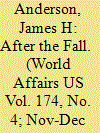

|
|
|
| 2 |
ID:
126202
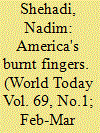

|
|
|
| 3 |
ID:
171873
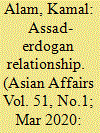

|
|
|
|
|
| Summary/Abstract |
Much has been made of the once brotherly relationship between Syrian President Bashar al Assad and the Turkish President Recep Teyep Erdogan. Indeed, this relationship formed the bedrock of Turkey's much-vaunted move towards the Arab world and its re-engagement with regions on which Ataturk and his successive Kemalist Generals had shut a door. Yet, more than fifteen years after the historic first visits by the Turkish and Syrian leaders to each other's capitals, the Syria-Turkey relationship lies in ruins. Whilst much of the focus of the war in Syria has been on the exaggerated sectarian divide in the Middle East and the great power rivalry between the United States and Russia, a key aspect overlooked is the fundamental relationship between Turkey and Syria. The last two decades of this relationship have been defined by Assad and Erdogan. As Turkey slowly begins to re-engage with Syria one can trace the tumultuous relationship between the two neighbours in the immediate aftermath of the dissolution of the Ottoman Empire. The Arab nationalists and Turkish nationalists have been at daggers drawn over the make up of the border. Syria has never forgotten the land-grab of the Turks in the aftermath of the French exit of the Levant. Furthermore, the diverse set of communities – the Greeks, the Armenians, the Kurds and the Syriacs – that make up the inhabitants of the region still suffer from the effects of the mismanagement of the French exit and what is seen by many of these communities as an illegal annexation by Turks and Arabs. However, under the Syrian Arab Republic the Christians of all denominations including the Armenians and Greeks flourished whilst Turkey forced only one identity upon its once diverse people. This article will argue that the relationship between Syria and Turkey has ebbed and flowed – and this dynamic is rooted in history where successive Turkic dynasties have favoured Syria as their pivot to control the region. Similarly, when Syria became less important, the very foundation of the Turkic and later Turkish influence became weak in the region. The close relationship between Erdogan and Assad overturned more than six decades of animosity, but once Erdogan turned his back to Assad and supported the overthrow of the Syrian government the relationship fell apart. As the end of the war nears, a defining factor to end this war will be how Turkey and Syria reconcile or interact. The Syrian Kurds now seem to be back in Assad's corner as they prefer to be under Damascus' sovereignty then under attack from Ankara across the border. The Kurdish question is of significant value to both Syria and Turkey; it has been a major reason for both countries to be at peace and war. A closer look at the history of these two countries' relationship proves that the Assad-Erdogan relationship has mirrored the history of the two states since the fall of the Ottoman Empire. Their future in more than one way is now inter-twined on how they interact with each other.
|
|
|
|
|
|
|
|
|
|
|
|
|
|
|
|
| 4 |
ID:
126048
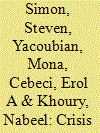

|
|
|
| 5 |
ID:
125298
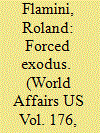

|
|
|
|
|
| Publication |
2013.
|
| Summary/Abstract |
In September, senior clerics from a dozen different Christian denominations all over the Middle East met in Amman, Jordan, for a conference organized by King Abdullah II. The subject was the crisis facing Christianity in the region, and what to do about it. Missing from the meeting were two prominent Arab prelates from Aleppo: Mar Gregorios Yohanna Ibrahim, the city's Syriac Orthodox bishop, and Metropolitan Boulos Yazigi, his Greek Orthodox counterpart. Both had been abducted by unidentified gunmen somewhere between Aleppo and Antioch in April, and their whereabouts were still unknown.
|
|
|
|
|
|
|
|
|
|
|
|
|
|
|
|
| 6 |
ID:
154171
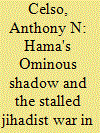

|
|
|
|
|
| Summary/Abstract |
Little has been written about the Syrian Civil War and its relationship to the 1980s revolutionary period. This essay examines this historical connection and emphasizes the unique features that drive the current rebellion. The essay has five sections. First, it lays out the historical roots of the current confessional-political conflict. Second, it provides an overview of the Muslim Brotherhood – led 1979 – 82 rebellion and its defeat in Hama. Third, it discusses the role that the Muslim Brotherhood revolt plays in the current conflict. Fourth, it analyzes jihadist infighting that has weakened the insurgency. Finally, it assesses the role that Russian, Iranian, and Hezbollah intervention has had in bolstering the regime of Bashar al-Assad. Syria's jihadist revolt has limited but important parallels to the failed 1982 Muslim Brotherhood insurrection. Even with the regime's conquest of Aleppo, the Islamist defeat in today's war is far from certain, although the current jihadist insurgency has stalled.
|
|
|
|
|
|
|
|
|
|
|
|
|
|
|
|
| 7 |
ID:
121059
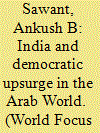

|
|
|
|
|
| Publication |
2013.
|
| Summary/Abstract |
The recent democratic upsurge in the Arab World - starting with Tunisia and passing through Egypt, Libya, and Yemen has already taken the toll of autocratic rulers of these countries. In Syria, a bitter fighting is going on between Assad's troops and opposition forces. The country is almost on the brink of Civil War and at any time the opposition may form their government and ask for international recognition. Almost every Arab country is affected by this upsurge, though many managed to survive for the time being, but the motion is already set in and it will have its impact in due course.
|
|
|
|
|
|
|
|
|
|
|
|
|
|
|
|
| 8 |
ID:
155112
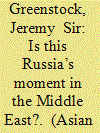

|
|
|
|
|
| Summary/Abstract |
Sir Jeremy Greenstock, formerly British permanent representative to the UN, who has had long experience of dealing with Russia in the context of diplomacy, considers whether the current moment of Russian dominance in Syria and the Middle East, combined with the recent general disengagement of the western powers in the region, could be considered as marking the beginning of a general period of Russian hegemony in the Middle East. The article takes into account the global geopolitical situation, the recent history of Russia and the Middle East, the consequences of western intervention in Iraq, and the motivations of the Russian government particularly in view of its recent engagement in Ukraine.
|
|
|
|
|
|
|
|
|
|
|
|
|
|
|
|
| 9 |
ID:
151913
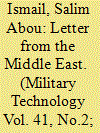

|
|
|
| 10 |
ID:
190721
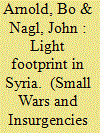

|
|
|
|
|
| Summary/Abstract |
Special Operations Forces (SOF) played an important role in defeating the Islamic State (ISIS) physical caliphate in Syria. Acting as a force multiplier, SOF successfully mobilized, armed, supplied, and directed an indigenous guerrilla force across northern Syria against a numerically superior entrenched enemy. This effort was underpinned by a flexible operational approach that adapted operational art to the unique characteristics of unconventional warfare. This paper provides a case study on the conflict with ISIS in Syria, focusing on the first phase of the campaign from 2014 until 2016, examining the elements of operational art which had the most significant impact on the outcome of the conflict. The application of operational art throughout the campaign sought to preserve and strengthen the friendly center of gravity – the Syrian Defense Forces, or SDF – by improving access to critical capabilities, controlling tempo, recognizing culmination criteria, and properly phasing operations and resources. SOF’s practice of sustained engagement garnered influence with the SDF and provided situational awareness to key decision makers, connecting tactics to strategy, engendering mutual trust, and allowing the agility that led to battlefield success.
|
|
|
|
|
|
|
|
|
|
|
|
|
|
|
|
| 11 |
ID:
115074
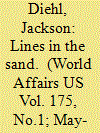

|
|
|
|
|
| Publication |
2012.
|
| Summary/Abstract |
On March 6, 2011, a group of fifteen schoolboys in the southern Syrian town of Daraa were arrested by local security forces. Aged ten to fifteen, the boys were caught spray-painting the slogan "As Shaab Yoreed Eskaat el nizam!"-"The people want to topple the regime!" They had taken the words from satellite television coverage of the uprisings in Tunisia and Egypt.
|
|
|
|
|
|
|
|
|
|
|
|
|
|
|
|
| 12 |
ID:
100343
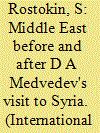

|
|
|
|
|
| Publication |
2010.
|
| Summary/Abstract |
ON MAY 11, 2010, the temperature in Damascus was significantly higher than average. Nevertheless, 37 degrees Celsius did not affect the program of the Russian president's visit. As planned, D.A. Medvedev and Bashar Assad met in the afternoon on the main street of the "old town,'' known two millennia ago as Via Recta.
From the place where the historical street reaches the Eastern Gate (Bab Sharqi), the Russian and Syrian presidents walked to the St. Ananias Chapel. In a narrow side street, packed with antique shops and restaurants, people were coming out from their apartments on upper floors to greet D.A. Medvedev and B. Assad. The atmosphere was extremely relaxed and informal.
It was the first time that the presidents communicated with each other, without a translator, on common topics. B. Assad told his guest about the unique history of old Damascus, the oldest capital in the modern world. The walk probably became the culmination of the visit, emphasizing the remarkable level of personal trust that the two countries' leaders had achieved in their relations.
|
|
|
|
|
|
|
|
|
|
|
|
|
|
|
|
| 13 |
ID:
121519
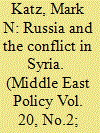

|
|
|
| 14 |
ID:
158948
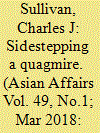

|
|
|
|
|
| Summary/Abstract |
Russia's military intervention in Syria (2015-present) has ensured the Assad regime's survival to date. Why though has Russia succeeded in achieving its objective? This article provides an analysis of Russia's involvement in the Syrian civil war in comparison to the Soviet Union's military debacle in Afghanistan (1979-89). Accordingly, by avoiding the USSR's mistakes in Afghanistan, this article posits that Russia has not become entangled in a protracted conflict in Syria. In Syria, Russia has militarily intervened to buttress the Assad regime, not to reorganize the host government's leadership and assume control over the war effort. Meanwhile, Syrian opposition forces lack concerted international support and Russia has allies that are assisting the embattled Syrian government. Lastly, Russia intends to ‘freeze’ the Syrian civil war in place by (i) pressuring opposition forces to submit and other countries to re-embrace Damascus in a diplomatic forum, (ii) endorsing Syria's claim to sovereignty, and (iii) relying upon a small military presence to deter others from destabilizing Assad's rule.
|
|
|
|
|
|
|
|
|
|
|
|
|
|
|
|
| 15 |
ID:
128802
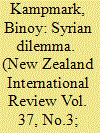

|
|
|
| 16 |
ID:
154172
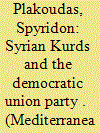

|
|
|
|
|
| Summary/Abstract |
By June 2016, the Kurds of Syria (just 12 percent of the country's total population) controlled almost all of the 822-kilometer Turkish-Syrian border and advanced against Manbij and Raqqa — the Islamic State's resupply center and capital, respectively. How did the Syrian Kurds grow from pariahs to kingmakers in northern Syria? This essay surveys the strategy of the Democratic Union Party (PYD), the most powerful organization among the Syrian Kurds, from 2011 until the first half of 2016, and shows how the PYD's realpolitik secured the party's survival and, eventually, success in the midst of a vicious sectarian civil war.
|
|
|
|
|
|
|
|
|
|
|
|
|
|
|
|
| 17 |
ID:
129629


|
|
|
| 18 |
ID:
126182
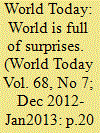

|
|
|
|
|
| Publication |
2012-13.
|
| Summary/Abstract |
A round-up of unexpected developments on the world stage in 2012, form the deaths of key Middle East players to the rise of K-pop
|
|
|
|
|
|
|
|
|
|
|
|
|
|
|
|
|
|
|
|
|